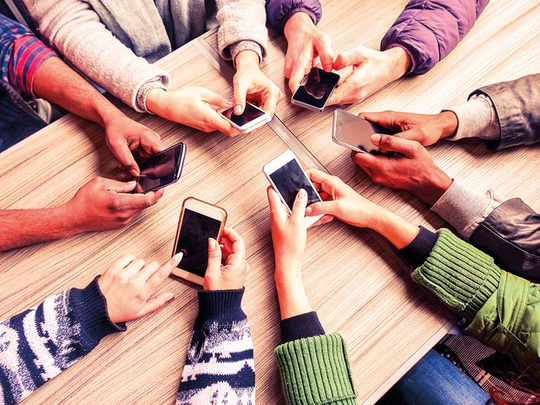
Nomophobia. Ever heard of it? Even if you say no, you might be experiencing it. In case you’re wondering, it is a 21st century term for the “fear of not being able to use your smartphone”.
Smartphone addiction is on the rise around the world, several global surveys have shown. However, while these devices might be enabling ease of communication, our bodies have a different reaction to them. A study published in the US-based journal, Journal of Computer-Mediated Communication, shows that constant alerts on our phones jolt our stress hormones into action, igniting our fight or flight response. Being unable to answer our phones can spike stress and anxiety. Our bodies and brains react in a manner that they would when we’re trying to outrun danger, when in reality we’re just unable to answer a call or text message from a colleague.
Aishwarya Subramanian, an Indian student based in Ajman, constantly relies on her smartphone for everything. From booking a taxi to ordering food, her phone is her gateway to the world.
She said: “It has become a part of my life. I cannot avoid it. Social networking is something we all do and it worries me if I don’t have my phone because I will not be able to make calls or reach out to my parents in case of an emergency.”
She imagines a situation where people’s phones stop working and how it could be chaos. When there was a network issue with her telecommunication provider, there seemed to be sudden panic.
She said: “There was a twitter hashtag about it. I also called them and asked what was happening. I need the phone to submit assignments and coincidentally, all the work comes up when it isn’t working!”
When she has no reason to be checking her phone, she will still do so to ensure she hasn’t missed a call, message or just a social media update. She wakes sometimes thinking her phone is ringing, when it actually isn’t.
In this, she isn’t alone. A study published in the US-based journal Computers in Human Behaviour shows that 89 per cent of American students report to feeling similar ‘phantom’ phone vibrations. They imagine that their phone is ringing, when it hasn’t actually buzzed.
Maria Erlinda Muyot Obligado, a Filipina national based in Sharjah, also experiences this on a daily basis. She claims to be on her phone “24/7”. She spends most of her time watching videos, checking social media and her friends’ profiles. Her phone, which is almost always in her hand, is like an extention of her now.
She said: “When I put it aside, I get concerned that I have missed a call or message and immediately pick it up to check. It’s like when you open the fridge, look inside and close it without taking anything.”
Her phone is her life. Everything is on it, from photos to bank accounts. “I don’t mind if I don’t have money in my pocket, but I need to make sure that my phone is with me,” she said.
Moses Waluke, a Kenyan safety operator based in Dubai, admits to being addicted to his phone, but says that he has his reasons. Living away from his family, he is able to connect with them easily courtesy his smartphone. Additionally, he has so much access to information, which he didn’t earlier and he gives all the credit to his phone and the internet.
He said: “There aren’t just negative things when it comes to such addictions. It keeps my family close to me, even though they are so far. It enables us to reach out to our loved ones back home all the time.”
When asked how he would feel if he didn’t have access to his phone, he laughed because he is sure that would never happen.
“I cannot leave it to far from me. It has to be close to me at all times. Even if I am going for a walk, I will keep my phone near. Sometimes I will check just to see if I have missed a call or message. And if I have, I will immediately call back. We are all so reliant on technology. Everything has changed.”
While there are many people who are addicted to their phones and are unable to put it aside, even for a few minutes, there are also those who go to another extreme to stay away from the world of smartphones.
Touseef Ashfaq, a Pakistani graphic designer based in Abu Dhabi, is one of them. He has removed all social media apps from his phone and only uses it to make calls or send text messages. As far as social media is concerned, he logs in only on his computer.
He said: “Once, my phone was hacked and the front camera was switched on. I felt like someone was using it. Since then, I have been very careful. I have nothing on my computer, so even if it gets hacked, I wouldn’t have to worry.”
In this day and age, he has never taken a selfie. Even when his friends try to take group shots, he prefers not to be in them.
So, while Ashfaq is content in a world without smartphones, can you imagine a life without them? Tell us at readers@gulfnews.com








